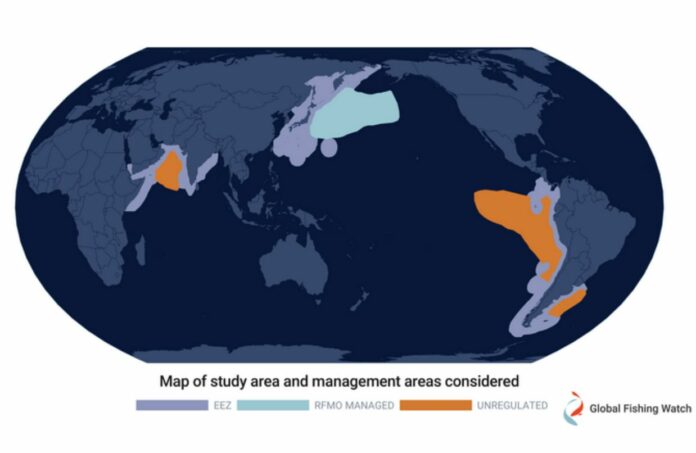A recent global study reveals that your squid is likely originating from unregulated waters. The study employs a comprehensive analysis of multiple data sources to provide deeper insight into the continually increasing presence of worldwide squid fleets.
There has been rising worry from scientists and politicians about the decline of global squid supplies, but a new international research finds that little has been done to far to target squid fishing operations that are extending into uncontrolled zones.
Katherine Seto, an associate professor of environmental studies at the University of California, Santa Cruz, led the research, which was published in Science Advances today.
Throughout a three-year period, it investigates the uncontrolled nature of global squid fisheries across three seas, and how these fisheries continue to develop and move places beyond the authority of regulatory authorities.
Global Fishing Watch, the Australian National Centre for Ocean Resources and Security at the University of Wollongong, and the Japan Fisheries Research and Education Agency collaborated on the study.
Using satellite images, vessel tracking, and data monitoring, the researchers reported that this globalized light-luring squid fishery did a lot of fishing, between 149,000 and 251,000 vessel days per year, and that the amount of fishing effort went up by 68% during the study period from 2017 to 2020.
Seto explained that the squid fishing industry is incredibly dynamic, operating across several oceans in a single year. Despite the existence of certain conservation and management measures to oversee this type of fishing, Seto’s research reveals that stakeholders may exploit the incomplete regulations to optimize their resource extraction. To mitigate this issue, it is crucial to identify the factors that fuel the expansion and development of fishing activities and encourage greater data sharing and communication among management organizations.
This analysis indicated that between 2017 and 2020, squid fishing boats spent a total of 4.4 million hours fishing in uncontrolled regions, which equates to 86% of all fishing time.
There are legitimate concerns about the human rights and labor abuses that may be associated with uncontrolled fishing, and although it may not be unlawful per such, it does pose problems for the long-term health of fisheries and resource equality.
“By synthesizing data from multiple sources,” adds co-author Nate Miller, they “created a robust picture of the fishing activity of the high seas squid fleets.
Their “analysis highlights the interconnectedness of fishing grounds used by the fleets” and also “demonstrates the critical importance of comprehensive data sharing agreements between regional bodies for improving understanding of the movements of these vessels and quantifying their impacts on squid stocks.”
The fact that boats are able to easily fish between licensed and uncontrolled zones, catching enormous quantities of squid with little to no supervision or data reporting, has been one of the most significant challenges.
According to the report, fishing in unrestricted regions has also progressively expanded and seems to be favoured despite worries about stock status.
“These unregulated fishing activities require urgent action,” points out co-author Quentin Hanich.
“They occur in our global commons, shared by all, yet few receive any benefit, and neighboring coastal States are increasingly concerned regarding the impact on their own shared fish stocks.”
“These catches are often not reported to domestic or international management bodies, nor are they incorporated into estimates of fishing effort, harvest, or stock status,” adds co-author Masanori Miyahara. “While it is good to see both the North Pacific Fisheries Commission and the South Pacific Regional Fisheries Management Organisation strengthen their management, urgent responses are also required in the Indian and Atlantic Oceans to ensure that fleets do not simply evade regulation by moving elsewhere.”
According to the research, in order to solve the issues associated with uncontrolled fishing, we must comprehend the elements that encourage the extension and augmentation of fishing operations as the demand for seafood products increases internationally.
“Like all activities in the global commons, fishing on the high seas should be fully regulated. Yet the regional bodies with the competence to adopt management measures are restrained by a handful of states whose self-interests are best served when such activities are unregulated or done with few limits,” adds Osvaldo Urrutia S., professor of international law at Pontificia Universidad Católica de Valparaíso in Chile. “The global squid fishery shows how important it is to strengthen regional management of high seas resources and to continue international calls for states and regional bodies to take this challenge seriously.”
Source: 10.1126/sciadv.add8125
Image Credit: Global Fishing Watch
